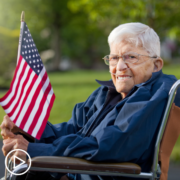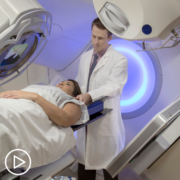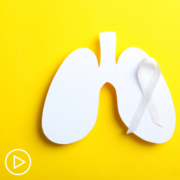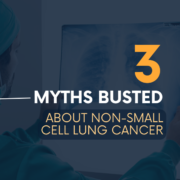Veteran Lung Cancer Risk | Understanding Exposures and Screening Protocols
Veteran Lung Cancer Risk: Understanding Exposures and Screening Protocols from Patient Empowerment Network on Vimeo.
What’s important for veterans to know about lung cancer risk? Expert Dr. Drew Moghanaki from UCLA Health discusses known veteran lung cancer risk factors, screening recommendations, and proactive patient advice involving the PACT Act.
[ACT]IVATION TIP
“…if you’ve had an office job, well, you probably have the same risk as your neighbor wherever you’re living. But if you were in a combat zone or on a base where there were a lot of chemicals, probably want to pay a little more attention and check in with your primary care doctor to get some appropriate screening tests for yourself.”
Download Resource Guide | Descargar guía de recursos
See More from [ACT]IVATED NSCLC Veterans
Related Resources:

Combating Disparities: Veterans’ Healthcare Access and Quality |

|

Lung Cancer Care for Veterans | Advancements in Radiation Oncology |
Transcript:
Lisa Hatfield:
Dr. Moghanaki, there is a stigma around military personnel being at higher risk for lung cancer than civilians. Is there an elevated risk for those in the military? If so, why and who should be screened?
Dr. Drew Moghanaki:
Yeah, the stigma of veterans being at higher risk for lung cancer is real. And I think Hollywood had a big role in it. And is it appropriate? Well, I never liked the word stigma, but I think it’s important for the public. And of course, soldiers or any military personnel who served in the armed forces appreciates that back in the days the bases were much dirtier than they are today. And there was a lot of exposure to a lot of things that can cause cancer and actually other health problems as well, such as diabetes and Parkinson’s disease and Alzheimer’s and other things.
So yes, it’s true that our veterans, especially if they were working around toxic chemicals or in the Middle East, where the open burn pits were leading to inhalation of a lot of toxic fumes, that these folks are at a higher risk and should be more proactive with any symptoms. So if you’re just a 45-year-old, 55-year-old male or female, and you’ve got a cough, generally speaking, you may not be so worried and just hope it goes away.
But if you’ve been on these dirty bases, it’s important to look into this and find out now how dirty are the bases? Well, there’s been the media I think over exaggerates exactly what was going on and what was on these bases. But there are lots of federal reports that have documented exactly some of the, for example, like if you were stripping aircraft with a certain stripping material, a lot of these substances are currently now chemicals are banned because we as soon as we learn that they’re toxic, we basically ban them.
But generally speaking, yeah, health concerns are a little bit elevated if you’ve served in the military and especially if you’ve been deployed in the field of battle. And so my activation tip is if you’ve had an office job, well, you probably have the same risk as your neighbor wherever you’re living. But if you were in a combat zone or on a base where there were a lot of chemicals, probably want to pay a little more attention and check in with your primary care doctor to get some appropriate screening tests for yourself.
Lisa Hatfield:
Are there any programs in place right now where veterans who’ve had those exposures or potential exposures, where they are being screened regularly or is it up to the veteran to ask that question?
Dr. Drew Moghanaki:
So if a veteran is plugged in with the VA healthcare system, the primary care network here is set up to offer the appropriate screening. But if you’re not, it’s important to look into this. Again, I’m just going to keep saying over and over again, if you’re a veteran who’s not yet eligible, if you know anyone, please check in. Congress has radically expanded the eligibility within the PACT Act is actually primarily centered around this issue of risk. It’s about toxic exposures that the VA is still learning about and VA physicians like myself are still learning about. And so these programs definitely exist to address them, but the best way to do it is to get registered for VA healthcare.
Share Your Feedback
Create your own user feedback survey






![[ACT]IVATED NSCLC Biomarkers Resource Guide [ACT]IVATED NSCLC Biomarkers Resource Guide](https://powerfulpatients.org/wp-content/uploads/ACTIVATED-NSCLC-Biomarkers-Resource-Guide-180x180.png)



